Alex Turnbull legal fight is all too familiar for Pengana’s Russel Pillemer
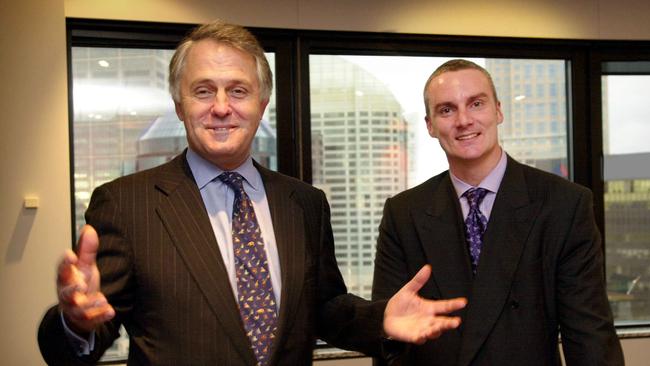
The high-profile legal battle between Alex Turnbull and fundie Russel Pillemer over a share loan turned bad has laid bare more than just the intricate details of the Turnbull family’s investments, exposing all manner of possible and perceived conflicts dating back to Pengana’s inception.
Among the troves of affidavits filed to the case, exchanges between the younger Turnbull and his father Malcolm’s one-time business partner show the two had been acutely aware of other ongoing legal matters, including a case brought by early investor Stuart Stuckey.
That case alleged Stuckey had been kept in the dark by Pengana over the deal to merge with Hunter Hall, the same sticking point now raised by the Turnbulls three years later.
In an exchange regarding discovery on the 2017 case Turnbull notes a journalist had inquired about the case, raising concerns as to the potential for Stuckey to share sensitive information.
“I know zero love lost between you and stu so he absolutely will play dirty if he sees any upside in it,” Turnbull writes.
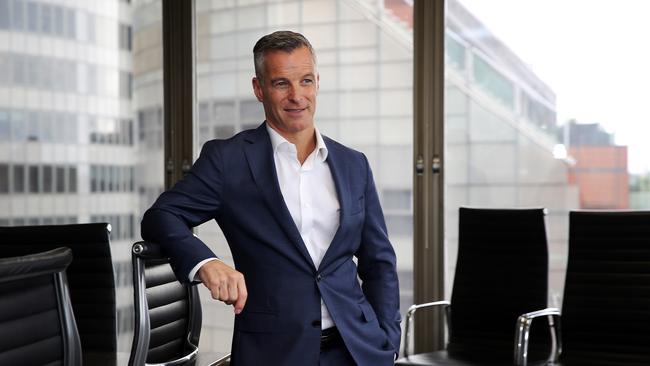
Back then, the two had plenty of common ground, Pillemer agreeing and adding: “I am very weary of SS … the only way that he can get traction is by creating a nuisance and embarrassing us with anything he finds in emails – and so basically blackmail us to pay him some $$ – which we have decided we will not do.”
While details on the court resolution in that case are harder to come by, Stuckey has succeeded at least in staying out of the local limelight.
It appears the 58-year-old has settled down in Britain where he is director of life insurance outfit Cushon, and raises horses through his Farm Cove Thoroughbreds.
The homeland appears to be not far from his mind however, one of his latest geldings to race is named after explorer Matthew Flinders.
–
Strange coincidence
We told you last week of Financial Review columnist Christopher Joye and the success of his ESG campaign in getting the NSW Treasurer Dominic Perrottet to back-pedal on a decision to add more debt to the state’s coffers.
A win for NSW taxpayers, he said, which just so happened to have a dual benefit of boosting performance of Joye’s bond fund Coolabah Capital too.
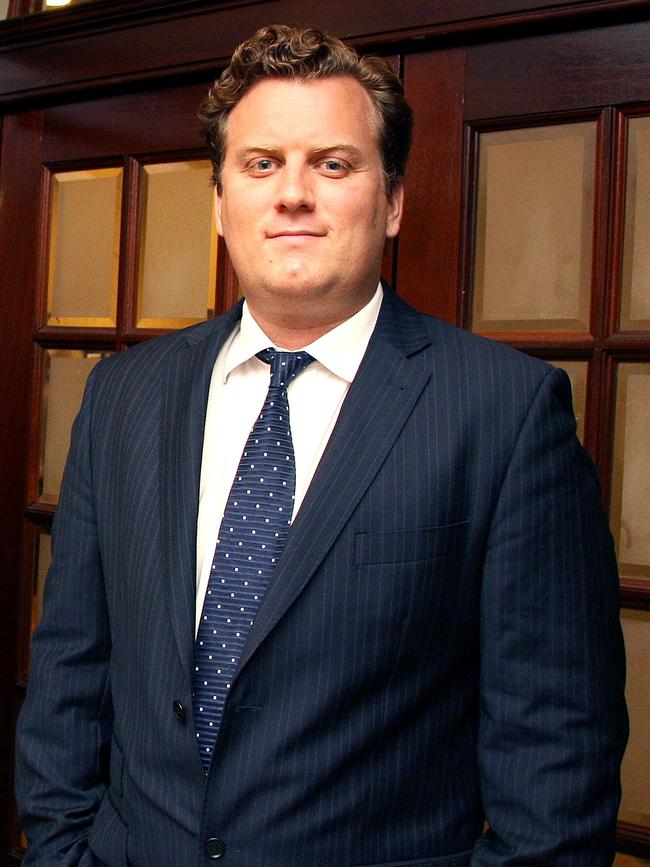
In an editorial following the decision, and our earlier mention, the columnist compared Perrottet’s move to pay back the state’s debt to the other news of the week – none other than Scott Morrison’s major geopolitical move in abandoning the French subs deal and siding with the US and Britain.
It is only the former, however, that he could claim any responsibility for and for more reasons than first thought.
Recall Margin Call pointed out Joye’s use of his own newspaper in this activist campaign, sources of information he is more than happy to share around.
Economics editor at the Fin, John Kehoe, noted in an exclusive report last month that former NSW Parliamentary Budget Office head Stephen Bartos had warned against the state’s debt strategy and its exposure to interest rate and equity movements.
Those comments hardly came as a surprise however, bearing remarkably similar resemblance to comments Bartos, this time in his private capacity as a consultant, provided in a paid report to Coolabah Capital just a day earlier, a copy of which was shared with the AFR.
Both Bartos and Joye maintain the report was independent, though the financial connection is not explicitly disclosed.
–
Vax attacks
It was hardly original when the Ross McEwan-led National Australia Bank swapped their NAB branding for JAB branding in support of the nation’s vaccine rollout, but the backlash to the marketing move sure can’t have come as a surprise.
Support for the vaccine has been a line corporate marketing teams tread with much trepidation, and the social media response to NAB’s bold move shows just why.
NAB’s head of personal banking Rachel Slade “(fully vaxxed)” – not the group’s chief marketing officer Suzana Ristevski, we note – took to LinkedIn to add her voice to the chorus of pro-vaccination posts.
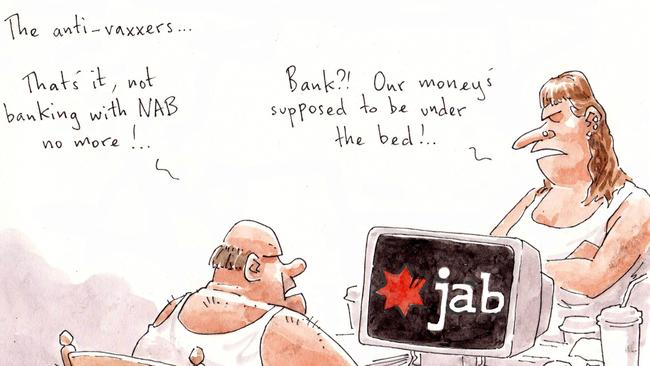
“Getting as many Australians vaccinated as possible is key to unlocking greater freedoms and protection for our customers,” she posted, going on to detail the branding move would be across billboards and TV commercials as well as signage at the AFL Finals.
But right on cue, the vocal anti-vax community came out in force, with one commenter pointing out that “clearly the vax went to your head” while another swore off banking with the firm altogether.
That was all after bookmaker TAB only a week earlier kickstarted the Jab branding move, which also included a #JABForAustralia social media campaign asking Australians to share the logo and explain their vaccination motives.
Unsurprisingly, there’s been little action on the hashtag, though we note racing industry account ThoroughbredNEWS has been a regular user.
All that while what may just be the only other “jab” candidate, Cabcharge, took a different tack, offering vouchers for cabs to vaccine appointments.
Pays to be original.
–
Salary sacrifice
If it wasn’t already apparent entrepreneur and serial investor Bevan Slattery has his fingers in all sorts of pies, one has but to take a look at the list of related-party transactions at his listed telco provider Superloop.
The Brisbane-based founder, with an estimated wealth in the ballpark of $450m according to The List: Australia’s Richest 250, took in a meagre $60,000 for his role as chair at the group in the past financial year.
His related entities however, are reaping the benefits.
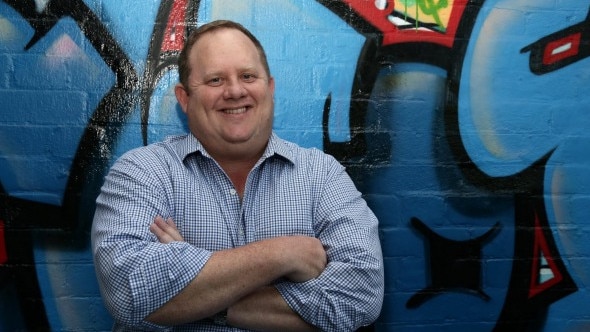
Cloud connectivity group Megaport took fees of $830,000 from the telco, while his subsea fibre cable infrastructure group APX Partners was paid just shy of $600,000.
Those contracts should endure even as Slattery himself takes a step back from the board, set to hand the reins to Peter O’Connell after taking on the position in the middle of the pandemic. “Since stepping in as Chair from the beginning of the pandemic in March last year, we have removed significant cost from the business, put in place a first-class management team, recapitalised the business, delivered on guidance given two years in a row, and made a transformational acquisition with Exetel,” he wrote in the group’s latest accounts.
All that for just $60,000 – someone alert the unions.



To join the conversation, please log in. Don't have an account? Register
Join the conversation, you are commenting as Logout